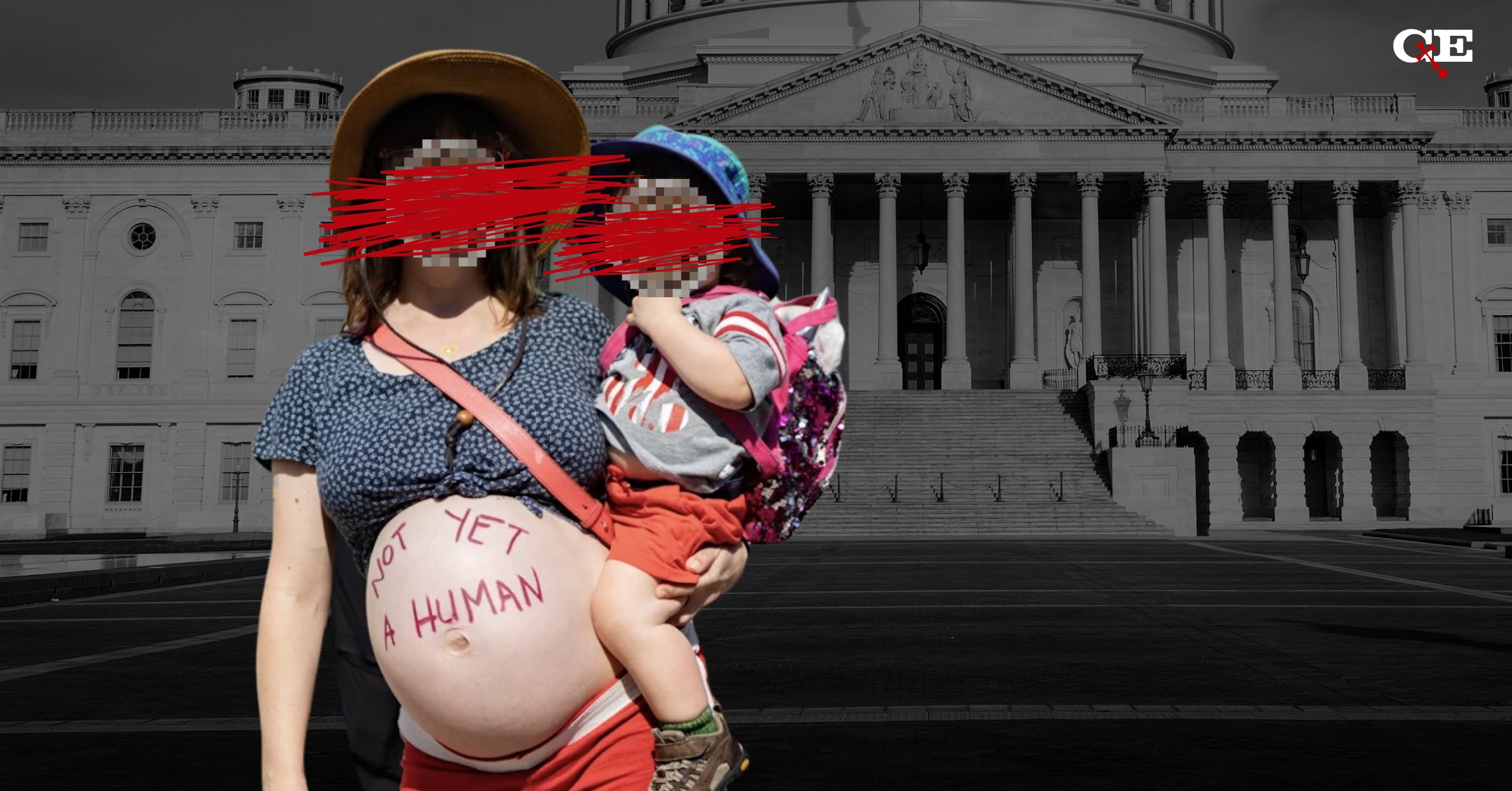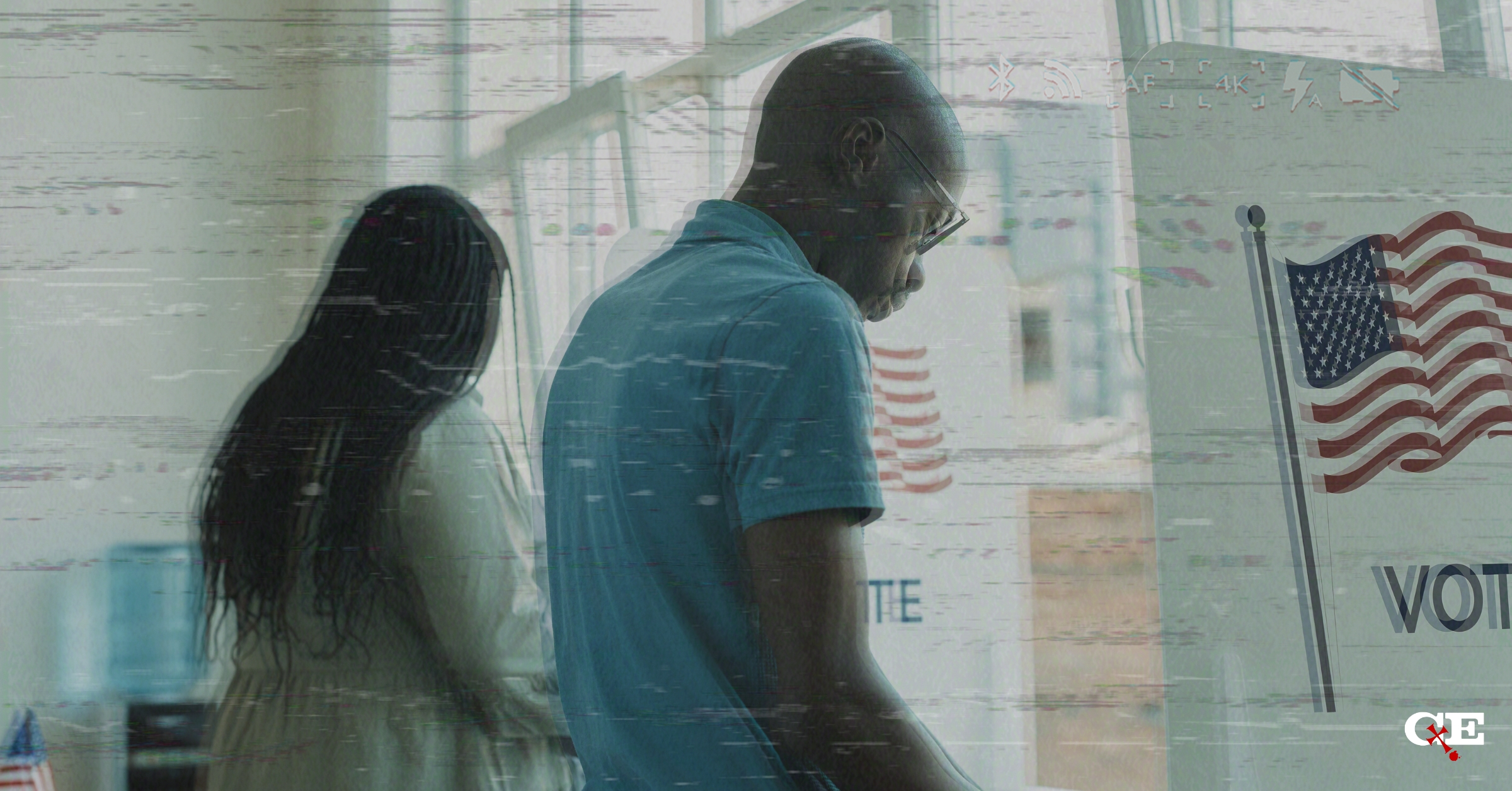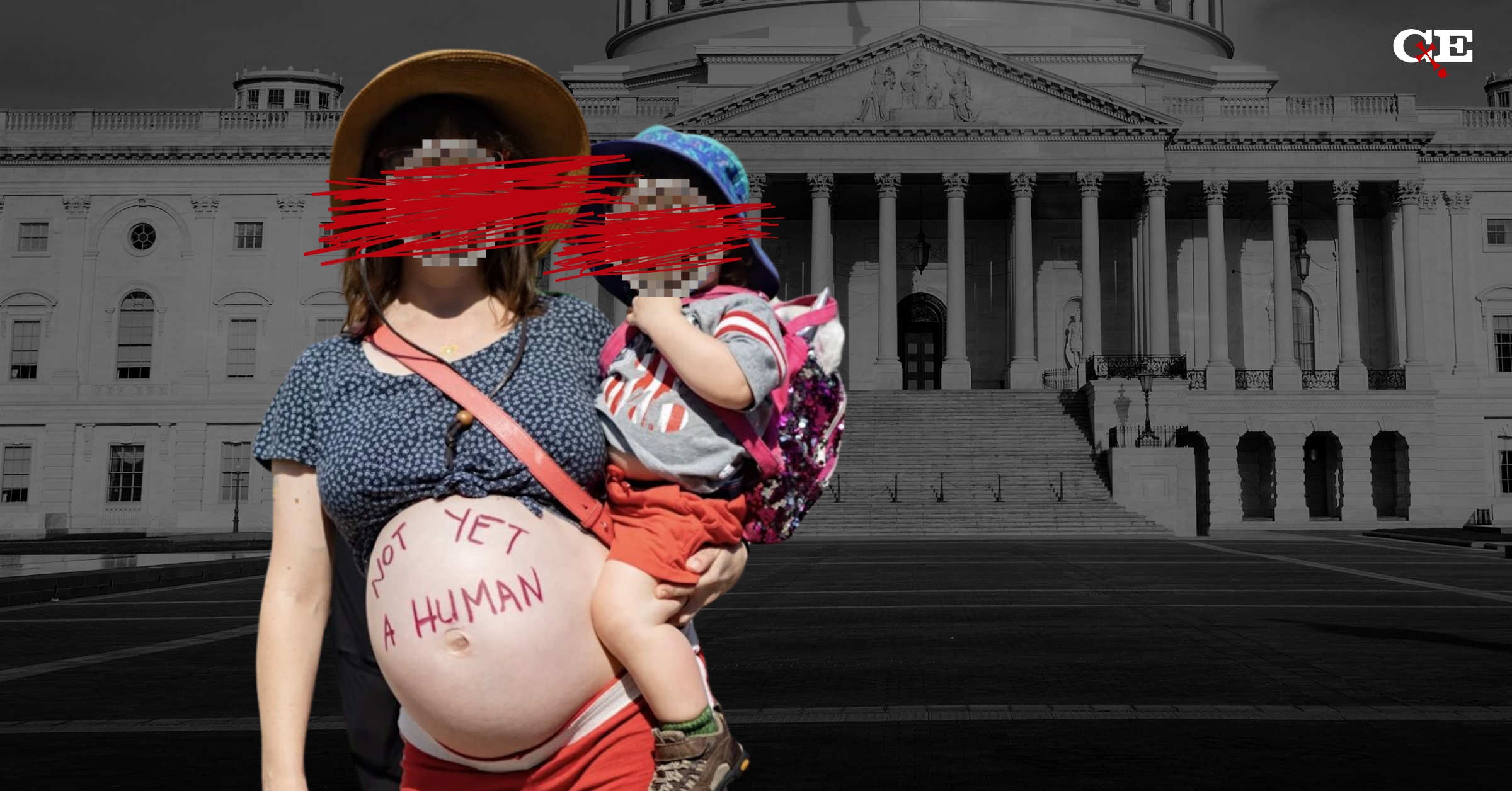Can we be pro-life personally but pro-choice politically? The quick answer to this loaded question is: No, we can’t really be pro-life personally if we are pro-choice politically. That’s because pro-lifers recognize that the child-in-utero is a human being, so the decision to abort isn’t a strictly personal decision at all, it’s an interpersonal decision. In that sense, it’s not a “private” decision (for just one person to decide). It’s a public decision (where at least 2 people are involved). Since abortion is an interpersonal act, it bears upon society and politics. Some people might not want to have an abortion, for themselves, but that does not qualify anyone as pro-life. Pro-choicers themselves recognize a “freedom to choose,” even when that includes choosing against abortion. In summary, if you are only “personally” pro-life, then you aren’t really pro-life.

What does “personally pro-life politically pro-choice” even mean?
The good news is that if you are “personally pro-life” that means you would never go through with an abortion. Congratulations! That’s an important and heroic stance. We can disagree and argue over the “politically pro-choice” part, but if you have taken any stand against abortion, then I commend you. Perhaps if more abortion-choice advocates were to go at least as far as “personally pro-life” then we’d have even fewer abortions than we currently do. Saving baby’s lives is worthwhile, no matter who is doing it. I would rather have someone personally pro-life than totally pro-choice. Most of what follows is aimed at the “politically pro-choice” part. If it’s not clear later, then let me make it clear now, I celebrate, encourage, and wholeheartedly support the fact that some pro-choice people have let the pro-life cause take root in their personal convictions. If they are “personally” pro-life, then they are a step closer to being fully pro-life (personally and politically). My whole effort in this article is to help extend that conviction further, beyond merely personal conviction, and into a fully formed pro-life outlook.
It’s Code Language for “Pro-choice”
Just to be clear, pro-lifers typically identify as anti-abortion both on a personal and public/political level. They can say, “I would never have an abortion and abortion should be generally banned.”[i] So when people try to drop the second half of that, wanting to blend pro-life and pro-choice, they are typically trying to sample the best of both worlds. Unfortunately, this hybrid, usually means they have a pro-choice perspective overall. To say you are only “personally” pro-life is often code language for, “I won’t go as far as the most radical pro-choicers, celebrating abortion or acting like it’s no big deal, but in point of fact, I’m still entrenched in the middle of the pro-choice camp.”
Most pro-choicers, by the way, admit that abortion is “bad.” They are not “pro-abortion.” Only the most radical/extreme pro-choice figureheads will act like abortion is commendable. Pro-choice advocates, generally, aren’t trying to promote more abortions or celebrate abortions.[ii] Most everyone on all sides admits that any given abortion is regrettable. So, it’s not terribly impressive when a pro-choicer says that abortions are gross, ugly, bad, or traumatic, they just think – contrary to pro-lifers – that abortion is a “necessary evil.” Abortion is not “good” but, so they say, it is good for women to have that choice.
Often, people don the hybrid position because they are pro-life at heart, but they are politically progressive and there just aren’t any solid pro-life platforms within the Democrat party (or Libertarian, or Green, or Socialist parties for that matter). In other words, they’d support a pro-life candidate if there was ever one campaigning within their party, but when left to choose between their pro-life convictions and their political party they are too allied to the Democrat party (for example) to stop fighting in the pro-choice army. Their pro-life convictions are burdensome and expendable. With the slightest threat of turbulence, they can throw their pro-life sentiments overboard for the sake of political expediency.
If you lean pro-life but can’t find a political candidate you’d support in your party, instead of sacrificing the pro-life cause for political expediency, I encourage you to let your candidates know how you feel! Press and pressure them to hear your voice. And withhold your vote till your party can offer a pro-life candidate worthy of your support. Abortion is a big enough issue to where it deserves to be a deal-breaker like that.
It’s Confused Compassion
To be sure, this hybrid position can flow from noble motives. People may don the hybrid position as an effort to balance compassion for both the child and the mother. Conventional pro-lifers often focus attention on the child-in-utero and don’t clarify just how much compassion and concern they have for the mother. Pro-choicers often focus attention on the mother while dehumanizing and delegitimizing her child-in-utero. Both of these extremes are problematic.
With the hybrid position, however, one may be trying to draw attention to both the child and the mother. This hybrid may sound like any of the following:
“I’m personally pro-life, but I vote pro-choice”
“I would never have an abortion, but I’m politically pro-choice.”
“Abortion is wrong for me, but we shouldn’t tell women what to do with their bodies.”
Notice the word “but” in between each of these clauses. The hybrid position tries to merge two camps, bridging a hostile divide. It has the tone of a strategic compromise. Indeed, this hybrid position is amenable to almost every stripe of pro-choice politics, except perhaps for the most radical population-control advocate. But pro-lifers, cannot, in good conscience, relegate abortion to the realm of merely “personal choice.”
The hybrid position treats abortion like an entirely private personal decision, so only the pregnant mother has moral standing in deciding the fate of her child-in-utero. This line of thinking suggests that we individuals can pick and choose whether abortion is right for us, but we should not try to tell anyone else that abortion is wrong for them. Supposedly, we all decide our own ethics of abortion. And abortion is such a personal decision that even if we conclude that it’s a terrible, horrible, very bad, no good practice – what we really mean is “it’s wrong for me.” It may be “right” for someone else in a different situation, or with different needs and interests. If this smells like relativism to you, I smell it too.
Compassionate motives are great, and we should celebrate compassionate concerns for mother and child alike. But no amount of good motivations are safe from spoilage in a cauldron of relativistic ethics. Apply this kind of logic to something that we can all agree is wrong, and you’ll see how this relativistic framework is shaky. For example, “I would never own a slave, but I would never tell someone else what they can or can’t do with their property [slaves].” If we start treating the most basic human rights like they aren’t absolute, then we end up with moral absurdities like say abolishing slavery is, “True for me, but not for you,” or “murdering gay people is, bad for our society, but is good for some other society.”
It’s Emotionally Pro-life but Intellectually Pro-choice
Another reason people may choose the hybrid position is because deep down they feel abortion is wrong but for whatever reason they believe that pro-choice is still a rationally sound position because of women’s privacy rights. The loss of a little baby is awful, but abortion isn’t bad enough to deserve civil abolition – like we’ve done with murder, slavery, rape, and a host of other evils. At a heart level, they sympathize with the pro-life position, but they know too many objections and defenses for the pro-choice position, and they still care about struggling mothers, so they hold steady to pro-choice politics.
One might say this person is emotionally pro-life but intellectually pro-choice. When they look at the facts of abortion, and weigh their own conscience on the matter, they see that abortion is wicked awful stuff. And they can’t comfortably support that action. But, when they look away and trust the commercials, the articles, and word-of-mouth they’ve gathered from liberal intellectual friends, professors, and authorities on TV, they find the pro-choice position compelling.
I’d suggest that usually when people hold this position they don’t understand the pro-life side very well and they’ve been duped by pro-choice rhetoric. They may have been pro-life in their younger days but the only arguments and evidence they’ve seriously considered have been from pro-choice professors, or political advocates, or both–politically partisan academics who aren’t interested in giving the pro-life position a responsible treatment. Sadly, if you formed your current views on abortion at college or graduate school there’s a good chance that your exposure to the abortion debate has been one-sided in favor of abortion-choice. Gallup Polls have shown that the longer you spend in college, the higher the chances you’ll declare yourself pro-choice.
If you aren’t sure about the solid ground supporting the pro-life position, I commend to you: Abort73.com, AbortionFacts, Lozier Institute, LiveAction, Equal Rights Institute, AbortionHistoryMuseum, TheAbortionMuseum. Having spent most of life in pro-life apologetics, I’m convinced that the only way people can reject the pro-life position is (1) they didn’t know it’s true, or (2) they don’t want it to be true. Getting informed can help solve the first part. Getting God in your life can help with the second.
“the only way people can reject the pro-life position is (1) they didn’t know it’s true, or (2) they don’t want it to be true. Getting informed can help solve the first part. Getting God in your life can help with the second.”
It’s the Muddy Middle
Other times, I find people adopt a hybrid position because they see themselves as “moderates,” trying to find the golden mean between extremes. These same people often avoid “labels,” and don’t like to be lumped into “categories” These middlers can boast that they aren’t extremists. And they may try to mitigate and avoid conflict by finding compromise positions in every debate. Abortion is a live debate in bioethics, politics, and society. So, it’s no surprise to find some conflict-avoiders mediating the debate with a compromise position trying to affirm the dignity of mother and child, dignifying the importance of life and liberty, and equally valuing both pro-life and pro-choice positions. There’s a general wisdom in seeking moderation, balance, and middle-ground where possible.
Unfortunately, the middle isn’t always a safe place to camp. Some battles don’t permit any neutral “sideline,” so everyone is already on the battlefield presently affected by the socio-political fallout of abortion-choice policy. Permitting some rhetorical flourish, those committed to both sides are entrenched in the middle of an open battle, subject to crossfire from both sides. Having meandered into and encamped in the middle of an active battle, they are torn between two allegiances. Effectively, they are casualties waiting to happen. The hybrid position is not a friend to both parties, it’s an enemy to everyone. In a battle of ideas, playing both the pro-life and the pro-choice position is akin to a turncoat, a double-agent, an enemy in the gates committed ultimately to an irrational contradiction, at best, or a dangerous compromise, at worst. Now, that person can save the life of her own child – and that heroism deserves praise – but she betrays her efforts by refusing to intervene and protect other imperiled human beings in utero.
This warfare analogy might sound harsh, extreme, or misleading but imagine someone trying to play the moderate position regarding sex-slavery: “I would never own a sex-slave, but I’m in no position to tell someone else what they can or cannot do with their sexual property.” Clearly, that “moderate” position has granted too much to the pro-slavers because they grant that human beings can be treated, ethically, like property. Pro-choicers, similarly, treat living human beings in-utero, like property that can be disposed at the will of his or her owner. Obviously, slavery is very different from abortion, but both should teach us that human beings aren’t property and should not be treated as such.
Or imagine a moderate position on the holocaust: “I would never gas a Jew, but who am I tell tell people from a different country, in a different culture, what they can and cannot do with their citizens.” The moderate has assumed that mass slaughter of unwanted human beings is not a crime against humanity, and it could be ethical in one society but unethical in another. This “moderate” position isn’t moderate at all. Unfortunately, it’s not uncommon either – moral relativism is quite popular in many circles. Yet moral relativism betrays the very notion of human rights, and has historically played a major role in the holocaust, slavery, and in recent times, abortion.
These ugly examples demonstrate that the middle ground between two politically charged positions is not always a golden mean. Sometimes, it’s a horrific compromise. The real “moderate” position should not be between pro-life (anti-abortion) and pro-choice (abortion-on-demand), but rather between which exceptional cases of abortion should be legal–ex., rape pregnancies, or imperiled pregnancies (threatening the mother’s life).
Remember that if abortion is a moral right of women, the pro-choicers are justified in fighting adamantly for it. If abortion is morally wrong, however, then pro-lifers are justified even moreso, as the scope of this evil is deadlier than any other act of violence in world history. Abortion in the United States has already claimed far more lives, in far less time, than the entire North American slave trade ever claimed. Yet slavery had no chance of abolition if “enlightened” northerners were committed to both slavery and abolition. Slavery was too entrenched of an evil for the abolitionists to play the moderate position as if slave ownership was an excusable “necessary evil.” In the Civil War, there was no strategic advantage in trying to say that slavery deserves to be abolished and yet it shouldn’t be abolished. That position is not only a logical contradiction, it’s morally unsound and politically foolish.
This same muddy middle makes no more sense when applied to apartheid South Africa. It would be equally foolish to say, “I personally oppose apartheid, but I’m not in any position to judge whether South Africa should or should not have apartheid. That’s for South Africa to decide for itself.”
Or we could apply it to infanticide and readily see the same contradiction: “I personally oppose murdering one’s newborn baby, but who am I to judge a struggling mother who feels like she needs to smother her inconvenient little baby for squirming too much. It’s her baby, so it’s her right to kill it if she wants.”
It’s Relativism
This hybrid position also carries a tone of moral relativism. As we saw above, the hybrid position easily retreats into individual or cultural relativism where some moral principle is only as authoritative as a group vote (cultural relativism), or a personal preference (subjectivism). For one person abortion is unethical, for the next person it’s ethical, for another person it’s sometimes ethical sometimes not. There would be no factual wrongness about abortion except with respect to one’s own personal standards of right and wrong. This brand of easily slips into “might makes right” ethics, committing the “popular appeal fallacy,” and it cannot distinguish consistently between “legal” and “moral.” In cultural relativism, slavery was ethical–as long as it was the legal convention of the time.
But truth isn’t decided by vote. And evil is still evil, even when it’s popular.
There are lots of problems with relativism. But I’ll just note one more important objection here. Abortion bears upon human rights, and human rights are not the kind of thing that qualify for relativism. If women have a human right to full autonomy over their own body, up to and including abortion, then abortion is ethically permitted – and that would be an objective moral fact, regardless of what any given women should “feel,” “think,” “believe,” or “prefer” within her own subjective or conventional ethics. Now that’s a pro-choice rebuttal to relativism.
The pro-life rebuttal runs even deeper. Beneath the right of autonomy, exists the right to life, as in:
“We hold these truths to be self-evident that all men are created equal. . . endowed by their creator with certain unalienable rights . . . life, liberty, and the pursuit of happiness.”
Preamble to the Declaration of Independence, 1776
Notice the right to “life” appears before the rights of liberty and the pursuit of happiness. This order is sensible because only living individuals have liberty, and only living individuals with some measure of liberty can pursue happiness as they see it. These three rights do not necessarily exhaust all our fundamental human rights, but they are sufficient to show how the rights of life and liberty relate. Pro-lifers have a strong, principled, and historic case that the most basic of all human rights is the right to life. I would argue that the abortion-choice camp hasn’t even come close to satisfying their burden of proof here. They have not yet shown that the mother’s claim of liberty (i.e., personal sovereignty, privacy, autonomy) gets deep enough to undermine and nullify the child’s potential, alleged, or possible right to life.
Furthermore, since killing a human being is an irreversible, final, and permanent act against a fellow member of the species, it should never be doled out for trivial reasons or in the presence of reasonable doubt.
In summary, abortion bears heavily upon human rights, human rights are too foundational to surrender to the flight and fancy of relativistic ethics, and so, abortion is a poor fit for relativism. Subjectivism and conventionalism just aren’t serious enough among the schools of ethics to account for the moral weight of that child’s life.
It’s Pragmatism
This hybrid “logic” could also sound persuasive if you understand pro-life policy to be too impractical to work for society. Many abortion-choice advocates will use the threat of “coathanger abortions” to intimidate people into agreement. The threat is something like, “If you ban even the safe abortions, then women will be forced to get unsafe abortions.”
There’s a cold logic to this. Pro-life advocates as well abortion-choice advocates all have to weigh the practical implications of their ideals. Anyone making society-wide policy needs to consider practicality. The abortion debate is not merely moral, it’s also a judicial and political debate. It’s a legal matter, and legality is bound on all sides by practical issues of enforcement.
Real-world policies, however, should not be measured against utopia either. Banning abortion won’t stop all abortions, nor will legalizing abortion stop all coat-hanger abortions. Practical concerns pull both ways, tempering both the pro-life and abortion-choice positions. Legalizing abortion hasn’t stopped illegal and unsafe abortionists from finding scared imperiled women to prey on. We know of prolific mass murderers like Dr. Kermit Gosnell, whose abortion-mill generated hundreds and thousands of illegal abortions, post-birth abortions (infanticides), and subjected patients to unsanitary, injurious, and even fatal conditions. But besides just his case, we could cite many more clinics, doctors, and nurses who prove that the abortion-industry is intrinsically unsafe, and many of its worst offenders operate with little to no regulatory oversight regulation due in part to the knotted political landscape of abortion.
We also know, from history, that legalizing abortion at a state level in the late 1960’s and then nationwide in 1973 radically multiplied the number of abortions. Restated, that means, the prior ban on abortions radically reduced the number of abortions. That fact points out that banning abortion would greatly serve women’s health interests since the very nature of abortion is medically and psychologically dangerous for women.
Even legal and relatively “safe” abortion is inherently risky for the mother. In 98-99% of cases the abortion is not protecting the mother’s life so it’s medically unnecessary. Being medically unnecessary, all of its inherent risks of its inherent risks are unnecessary risks. The physical risks are many including cuts, punctures, bruising, heavy bleeding, disfigurement, drug interactions, incomplete abortions (leaving parts of the deceased child behind), and all the subsequent side effects that may occur with those problems including infection, sepsis, fever, headaches, dizziness, nausea, scarring, blood clots, coma, heart attack, and even death.
Possible long-term side effects and complications are often disputed but are thought to include sterility, pre-term birth, miscarriage, malfunctioning cervix, menstrual irregularities, and correlation with breast cancer. There are also a range of psychological risks – even for “safe” and “legal” abortions–which have been demonstrated in multiple studies. Pro-choicers tend to focus on the short-term sense of relief reported by abortion patients, but in long-term studies abortion patients report post-traumatic stress disorder, depression, anxiety, thoughts and attempts at suicide, broken relationships, drug and alcohol abuse, divorce, broken relationships, self-destructive behaviors, and a constellation of problems correlated with serious emotional trauma. Of course, the abortion-choice industry has tried to dispute all these claims about the dangers of abortion, but it’s medically naive to think of abortion as medically inert. And, even if child-birth were just as risky or riskier, the dangers are heavily mitigated by the birth of live child. Abortion isn’t safer than childbirth. It’s not safe for the mother. And it’s just not safe.
We should also consider how the abortion industry influences our sexual choices. First wave feminists at the turn of the 20th century, for example, decried abortion as a mode of exploiting women. Instead of reigning in men and calling them to take responsibility for the women and children in their lives, abortion is one more legal excuse for males to treat women like sex objects; love ’em and leave ’em. Given the preponderance of illicit sex, sex-trafficking and pornography, combined with the declining rate of marriage there is a strong case to be made that abortion-choice policy hasn’t been very “practical” at all. It set up countless women for exploitation, loneliness, and trauma, while setting the heaviest and fatal consequence on defenseless children-in-utero.
We have more than enough reasons, therefore, to think that pro-life policy would serve women’s health fare better than pro-choice policy has. Pro-life policy is practical.
It’s Cowardice
Other people may take the “personally pro-life” position because they aren’t terribly pro-life in the first place. No abortion choice advocate wants to be seen as a barbarian or a villain. And donning some of the terminology and tone of a pro-lifer may lend a sense of tolerance and compassion. Wearing the facade of an outspoken pro-life advocate doesn’t take a lot of courage, but it does take some courage. And some people just don’t have enough courage to take a consistent pro-life stand. Perhaps they lack the conviction or the knowledge. But whatever the cause they are too timid to fully align with the pro-life position. They may still think abortion is bad but they lack the fortitude to take a firm stand against it.
It’s easy to understand why people would be timid when they aren’t well-informed on the issue. If knowledge is power, then ignorance is crippling. Courage turns to cowardice when we don’t understand the issue well enough to have an informed opinion on it. In that event, a “moderate” pro-lifer or pro-choicer may be scared to explain or defend their pro-life position. By default, they gravitate toward the muddy middle, imagining it safer to appease both camps and avoid having to state, explain, or defend their position beyond a few shallow talking points.
Many pro-lifers and pro-choicers, in my experience, stay fairly moderate on the issue and aren’t terribly informed about the risks involved in abortion, or about the size and scope of abortion, or about the wider effects of abortion on society, or the history of abortion in America. Often, they don’t even know what an abortion looks like, or what the developing child looks like in a first-term abortion. It is no surprise that people may claim to be “pro-life” but, for fear of offending a pro-choice friend or family member, they immediately buttress that position with a fatal concession to pro-choice policy. They are “personally pro-life” – which is politically neutral, and wholly non-threatening to anyone else – but they are tolerant towards anyone else’s pro-choice politics or policies. They won’t even stand against abortion-choice legislation because their “pro-life” stance is effectively hidden from the world, squirreled away in the private recesses of their personal preference within their own bedroom at home.
In other words, to be “personally pro-life” is often ignorance-fueled cowardice. Now, I don’t say that lightly, but neither do I intend this as a mean-spirited insult. All of us have something to learn about this issue, and to the extent that we don’t understand or we just don’t know the specifics we can be crippled in our convictions and prone to cowardice. The simple solution then is to get informed. Study a bit. Guard our claims, saying what we know, admitting what we don’t know, and allowing ourselves to learn in the process. We can grow in our convictions and our courage as we learn. And through it all, we should maintain an attitude of humility, grace, and love.
It’s Ignorance
Ignorance poses another problem here besides inspiring cowardice. Sometimes people simply don’t realize how incompatible are the two camps. They may ascribe to the hybrid position because they believe that being “pro-life” is nothing more than saying, “I find abortion distasteful.” But since many pro-choice advocates find abortion distasteful, then that’s hardly a defining feature. That limp and flimsy form of “pro-life” may be due to ignorance.
A more troubling trend is when people affirm the hybrid position because they really don’t want to know what is involved in abortion. They may regret that some people choose abortion, but they don’t want to get informed enough to get involved in any solution. For them “ignorance is bliss.” Ignorance is an evasive maneuver, so they don’t have to take any responsibility. Just as good samaritan laws obligate competent bystanders to help people in dire situations, a person may be morally obligated to help a pregnant friend or neighbor choose life. But they are only responsible if they are competent to help. If they don’t know enough to help, then they aren’t morally responsible to help.
The straightforward solution for ignorance is knowledge, but of course, that’s a difficult task whenever it’s willful ignorance. There’s no knowledge so penetrating that people will receive it against their will.
It’s Political Confusion
Few issues have been as politicized as abortion. So, in many people’s eyes “abortion” is just another political issue. Some people may claim to be only “personally pro-life” but not politically because the political law of the land is pro-choice and they don’t want to fight about it. In their eyes it’s expedient or even ethical, to be “tolerant,” and “open-minded” on the issue. They don’t like arguing about politics or religion, so they don’t say anything is wrong with abortion-choice policy.
There’s some cold logic to this position, as it’s part pragmatism, and it can swirl in elements of “compassion,” and “tolerance” (i.e., often in the form of relativism). For people who are wishy-washy in their politics, or they aren’t willing to disagree with flawed party platform, then the hybrid option may sound very appealing.
There is, however, nothing intrinsically political about abortion, Democrats can and have been pro-life. Republicans can and have been pro-choice. Ideally, all major parties could agree that killing one’s own innocent defenseless family members is unethical and should be banned. But, unfortunately, the political lines have been drawn and the rhetoric has been loaded like artillery so that any democrats will be fired upon like an enemy spy plane if they dare question the value of Planned Parenthood or if they suggest that abortion is barbaric. Political liberals, in this way, would do well to distinguish themselves from the Democrat establishment so they are never pressured and pulled into a party platform that they can’t support in good conscience. Likewise for political conservatives, they shouldn’t be so married to the republican party that they cannot stiff-arm any foolish unethical policies popular within the establishment. Republicans may, generally, have a better record on pro-life policies, but they have not always sided with life, especially when it’s unpopular.
I should add, that even though Democrats should accommodate the pro-life position I don’t think Republicans should be open to abortion-choice policy. Republicans should be no more open to abortion-choice than they should be open to reinstating slavery. I know that’s a touchy comparison, but policies which treat human beings like objects that can be used and disposed at will are intrinsically wrong at the level of human rights, regardless of one’s politics. We don’t even need to haggle over the definition of “person” or when “consciousness” begins. Abortion kills biological human beings as if those humans were some disposable property. Objectifying humans is wrong, whether by slavery or abortion. Just as no self-respecting democrat would support slave laws that allow for the objectification of human beings, they should likewise be able to renounce their party platform and stand on the side of life.
Abortion is the single deadliest act, institution, or event in world history.
Also, we do well to remember that we are talking about the single deadliest act, institution, or event in world history. In this way, abortion is a bigger issue than party politics. Democrats would do well to take the pro-life platform more seriously, especially since they missed the boat 150 years ago when the Democrat party sided with the biggest human rights crime of that era too. I don’t care to defend or promote republicanism or democrat politics here. All political parties have a mixed history on human rights issues. Democrats aren’t all wrong, and Republicans aren’t all right. Pro-lifers, unfortunately, have few voting options on the Democratic side these days. When it comes to the anti-abortion position, the Republican party has a better record–though not by much.
A Final Word on Being “Personally Pro-life”
Clearly, there are some glaring problems when people attempt to straddle the fence on the abortion issue. We have plenty of reasons to broadly reject the hybrid position. But it’s still better to be personally pro-life than totally pro-choice. If you personally would never go through with an abortion, I applaud you! If you refrained from an abortion because you are generally pro-choice but personally pro-life, then you still saved a life. Choosing life merits celebration every time! It is better to have a political pro-choicer personally abstain from abortion than to have a pro-lifer who betrays their conscience and aborts their unborn child. When all the smoke settles, we each still have to answer for the decisions we make in our own lives, regardless of our ideologies.
If you are “personally pro-life” but “politically pro-choice” then I encourage you to consider going the whole way and just be pro-life. Abortion is too devastating, too deadly, too violent, too harmful to women. It doesn’t even deserve half-hearted support. We all do well to consider and commit to a genuine pro-life stance. The pro-life cause goes beyond just personal opinions, preferences, or relativistic ethics. “Pro-life” refers to a fundamental recognition that the child-in-utero deserves protection; not just your child or my child, but every child. If you are only “personally” pro-life then I plead with you, don’t let your compassion stop with your own family planning prospects. Care for all the women and children imperiled by abortion. If we don’t speak for the voiceless, they will never be heard.
References:
[i] By “generally banned,” I mean the banning of convenience abortions where the mother’s life is not in danger. Other mitigating circumstances might include cases of “rape” or “severe deformity.” Pro-lifers usually, however, oppose abortion even in these exceptional cases of rape and fetal deformity, although most consider abortion justified as “life-saving” if pregnancy imperils the mother’s life.
[ii] While most pro-choice advocates do not knowingly support an increase of abortions, it’s a well known fact of groups like Planned Parenthood that abortions are a major source of revenue, and more abortions spells more profits. In this way, clinics may encourage higher numbers of abortions–but not because of any belief that “more abortions is morally better,” but merely because of profit incentive. This profit-incentive is the substance behind allegations of “abortion quotas” at Planned Parenthood clinics. Former Planned Parenthood clinic directors have attested to the quotas, but these claims have been disputed by opponents.
Recommended Resources:
Correct not Politically Correct: About Same-Sex Marriage and Transgenderism by Frank Turek (Book, MP4, )
Does Jesus Trump Your Politics by Dr. Frank Turek (mp4 download and DVD)
The Case for Christian Activism (MP3 Set), (DVD Set), and (mp4 Download Set) by Frank Turek
Legislating Morality: Is it Wise? Is it Legal? Is it Possible? by Frank Turek (Book, DVD, Mp3, Mp4, PowerPoint download, PowerPoint CD)
Dr. John D. Ferrer is a speaker and content creator with CrossExamined. He’s also a graduate from the very first class of CrossExamined Instructors Academy. Having earned degrees from Southern Evangelical Seminary (MDiv) and Southwestern Baptist Theological Seminary (ThM, PhD), he’s now active in the pro-life community and in his home church in Pella Iowa. When he’s not helping his wife Hillary Ferrer with her ministry Mama Bear Apologetics, you can usually find John writing, researching, and teaching cultural apologetics.
Originally posted at: https://bit.ly/48dVzcJ


















